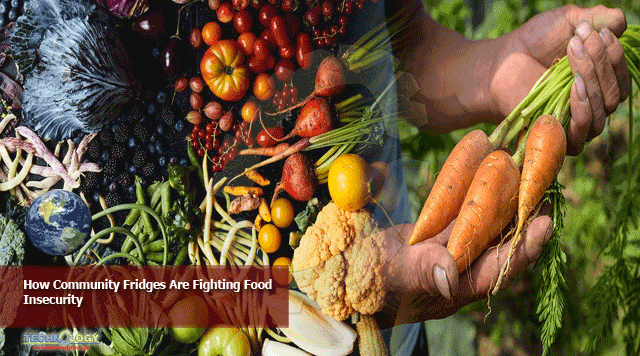Community fridges, It hums quietly indicating it’s working, and not abandoned. The fridge is painted purple and sports a face with arched green eyebrows

A playful curl down its forehead. Beneath the face, a written message: “Free food for all! Take some, leave some, keep it clean!” Inside, on its shelves, is fresh produce, left there by caring neighbors, supportive passersby, or bought with donations made to Playground Coffee Shop, a community-minded cafe run by Zenat Begum. Everything inside the fridge is free.
In a little over a week, Begum and her team of Playground employees, volunteers, and friends have set up almost 10 such fridges across Brooklyn—the majority in Bed-Stuy, Crown Heights, and Sunset Park. The premise is simple: functioning fridges, usually sourced through Craigslist, filled with fresh fruits and vegetables for the taking. “We’re only encouraging people to give fresh produce because that’s what the war is on,” Begum tells me over the phone. Most of the fridges are also set up near local independent businesses, in the hopes that they’ll also receive some of the attention the fridges attract. “We’re using our own sidewalks to do this because that’s where the people are at.
Community fridges in public spaces rose to prominence in Germany, when an organization called Foodsharing set up the first ones in 2014. Since then, these curbside fridges have spurred on a culture and spirit of their own: they can be found on every continent save Antarctica.
Recently, they’ve emerged all over New York City. The timing is no coincidence: Over the last few months, the disproportionate ramifications of COVID-19 on Black and Brown communities have thrown the city’s pervasive racial and class disparities into even harsher relief. As swathes of people found themselves newly unemployed, and entire communities grew food insecure, a slew of community organizers like A New World in Our Hearts started setting up fridges across the city and organizing food drives and giveaways. Others followed in Brooklyn, the Bronx, and Harlem. When the Black Lives Matter protests surged in early June, Begum and her team decided it was time to address their neighborhood’s needs, and provide support and assistance to vulnerable populations.
“I think it’s important that we’re responding and being able to create solution-based activism for our community, especially when social welfare reform is few and far between,” said Begum.
This outwardly focused mentality has been a trademark of Playground’s ethos since the coffee shop first opened. They’re a symbol of hope in Bed-Stuy, a historically Black neighborhood whose identity is being rapidly reconfigured by a wave of gentrifying residents, businesses, and developers. “Restaurants in general are very wasteful, but for the last four years we’ve been trying to encourage a different narrative,” she says. Begum and her team host readings, pop-ups, and workshops; and offer sliding scale brunches as part of programming. And since the start of the recent protests, they’ve been providing PPE (Personal Protection Equipment) kits and water bottles for protesters. Now, they’re setting up fridges.
This news was originally published at msn.com